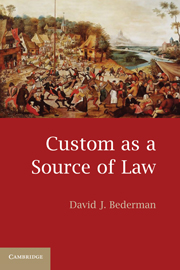10 - Private International Law
International Commercial Usage
Published online by Cambridge University Press: 05 June 2012
Summary
Custom and commerce in transnational trade have been inextricably linked for millennia. The customary norms of international commerce have been a traditional part of what has been called the lex mercatoria and lex maritima, that body of law respected and followed by merchants and ocean-traders. But international commercial norms present a number of doctrinal puzzles, and these will be considered in this chapter.
The first is the extent to which they can ever be truly independent of domestic legal systems. The traditional historical account is that from antiquity and the Middle Ages, the customary regimes of the law merchant and maritime law were created and enforced in a manner that was utterly free from interference by law-making mechanisms in any one polity. While these customs were often compiled and codified, they still reflected the actual usages of trade by the merchants and mariners involved. Indeed, the way in which disputes under these norms were typically resolved was by expedited recourse to panels of arbitrators selected from the relevant commercial community. Over time, merchant tribunals were co-opted as merchant juries by regularly constituted local courts. With the positivist legal revolution of the mid-nineteenth century, even this last vestige of autonomy for the lex mercatoria disappeared, and international commercial law became the creature of domestic courts and legislatures. But is this standard legal history narrative accurate? Did transnational commercial customs really disappear? And has there today been a renaissance for the international law merchant, reinvigorated and reconceptualized, and now truly globalized and autonomous?
- Type
- Chapter
- Information
- Custom as a Source of Law , pp. 117 - 134Publisher: Cambridge University PressPrint publication year: 2010



